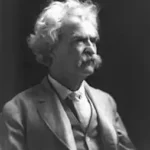 | |
Christian Science and the book of Mrs. Eddy | |
| Author | Mark Twain |
|---|---|
| Published |
1868
|
| Language | English |
| Nationality | American |
| Genre | American Literature, Humor |
1868 Short Story
Christian Science and the book of Mrs. Eddy
Christian Science and the book of Mrs. Eddy is an English American Literature, Humor short story by American writer Mark Twain. It was first published in 1868.
Christian Science and the book of Mrs. Eddy
by Mark Twain
‘It is the first time since the dawn-days of Creation that a Voice has gone crashing through space with such placid and complacent confidence and command.’
I
This last summer, when I was on my way back to Vienna from the Appetite-Cure in the mountains, I fell over a cliff in the twilight and broke some arms and legs and one thing or another, and by good luck was found by some peasants who had lost an ass, and they carried me to the nearest habitation, which was one of those large, low, thatch-roofed farm-houses, with apartments in the garret for the family, and a cunning little porch under the deep gable decorated with boxes of bright-coloured flowers and cats; on the ground floor a large and light sitting-room, separated from the milch-cattle apartment by a partition; and in the front yard rose stately and fine the wealth and pride of the house, the manure-pile. That sentence is Germanic, and shows that I am acquiring that sort of mastery of the art and spirit of the language which enables a man to travel all day in one sentence without changing cars.
There was a village a mile away, and a horse-doctor lived there, but there was no surgeon. It seemed a bad outlook; mine was distinctly a surgery case. Then it was remembered that a lady from Boston was summering in that village, and she was a Christian Science doctor and could cure anything. So she was sent for. It was night by this time, and she could not conveniently come, but sent word that it was no matter, there was no hurry, she would give me ‘absent treatment’ now, and come in the morning; meantime she begged me to make myself tranquil and comfortable and remember that there was nothing the matter with me. I thought there must be some mistake.
‘Did you tell her I walked off a cliff seventy-five feet high?’
‘Yes.’
‘And struck a boulder at the bottom and bounced?’
‘Yes.’
‘And struck another one and bounced again?’
‘Yes.’
‘And struck another one and bounced yet again?’
‘Yes.’
‘And broke the boulders?’
‘Yes.’
‘That accounts for it; she is thinking of the boulders. Why didn’t you tell her I got hurt, too?’
‘I did. I told her what you told me to tell her: that you were now but an incoherent series of compound fractures extending from your scalp-lock to your heels, and that the comminuted projections caused you to look like a hat-rack.’
‘And it was after this that she wished me to remember that there was nothing the matter with me?’
‘Those were her words.’
‘I do not understand it. I believe she has not diagnosed the case with sufficient care. Did she look like a person who was theorising, or did she look like one who has fallen off precipices herself and brings to the aid of abstract science the confirmation of personal experience?’
‘Bitte?’
It was too large a contract for the Stubenmadchen’s vocabulary; she couldn’t call the hand. I allowed the subject to rest there, and asked for something to eat and smoke, and something hot to drink, and a basket to pile my legs in, and another capable person to come and help me curse the time away; but I could not have any of these things.
‘Why?’
‘She said you would need nothing at all.’
‘But I am hungry and thirsty, and in desperate pain.’
‘She said you would have these delusions, but must pay no attention to them. She wants you to particularly remember that there are no such things as hunger and thirst and pain.’
‘She does, does she?’
‘It is what she said.’
‘Does she seem o be in full and functional possession of her intellectual plant, such as it is?’
‘Bitte?’
‘Do they let her run at large, or do they tie her up?’
‘Tie her up?’
‘There, good-night, run along; you are a good girl, but your mental Geschirr is not arranged for light and airy conversation. Leave me to my delusions.’
II
It was a night of anguish, of course–at least I supposed it was, for it had all the symptoms of it–but it passed at last, and the Christian Scientist came, and I was glad. She was middle-aged, and large and bony and erect, and had an austere face and a resolute jaw and a Roman beak and was a widow in the third degree, and her name was Fuller. I was eager to get to business and find relief, but she was distressingly deliberate. She unpinned and unhooked and uncoupled her upholsteries one by one, abolished the wrinkles with a flirt of her hand and hung the articles up; peeled off her gloves and disposed of them, got a book out of her hand-bag, then drew a chair to the bedside, descended into it without hurry, and I hung out my tongue. She said, with pity but without passion:
‘Return it to its receptacle. We deal with the mind only, not with its dumb servants.’
I could not offer my pulse, because the connection was broken; but she detected the apology before I could word it, and indicated by a negative tilt of her head that the pulse was another dumb servant that she had no use for. Then I thought I would tell her my symptoms and how I felt, so that she would understand the case; but that was another inconsequence, she did not need to know those things; moreover, my remark about how I felt was an abuse of language, a misapplication of terms–
‘One does not feel,’ she explained; ‘there is no such thing as feeling: therefore, to speak of a non-existent thing as existent as a contradiction. Matter has no existence; nothing exists but mind; the mind cannot feel pain, it can only imagine it.’
‘But if it hurts, just the same–‘
‘It doesn’t. A thing which is unreal cannot exercise the functions of reality. Pain is unreal; hence pain cannot hurt.’
In making a sweeping gesture to indicate the act of shooing the illusion of pain out of the mind, she raked her hand on a pin in her dress, said ‘Ouch!’ and went tranquilly on with her talk. ‘You should never allow yourself to speak of how you feel, nor permit others to ask you how you are feeling: you should never concede that you are ill, nor permit others to talk about disease or pain or death or similar non-existences in your preserve. Such talk only encourages the mind to continue its empty imaginings.’ Just at that point the Stubenmadchen trod on the cat’s tail, and the cat let fly a frenzy of cat-profanity. I asked with caution:
‘Is a cat’s opinion about pain valuable?’
‘A cat has no opinion; opinions proceed from the mind only; the lower animals, being eternally perishable, have not been granted mind; without mind opinion is impossible.’
‘She merely imagined she felt a pain–the cat?’
‘She cannot imagine a pain, for imagination is an effect of mind; without mind, there is no imagination. A cat has no imagination.’
‘Then she had a real pain?’
‘I have already told you there is no such thing as real pain.’
‘It is strange and interesting. I do wonder what was the matter with the cat. Because, there being no such thing as real pain, and she not being able to imagine an imaginary thing, it would seem that God in his Pity has compensated the cat with some kind of a mysterious emotion useable when her tail is trodden on which for the moment joins cat and Christian in one common brotherhood of–‘
She broke in with an irritated–
‘Peace! The cat feels nothing, the Christian feels nothing. Your empty and foolish imaginings are profanation and blasphemy, and can do you an injury. It is wiser and better and holier to recognise and confess that there is no such thing as disease or pain or death.’
‘I am full of imaginary tortures,’ I said, ‘but I do not think I could be any more uncomfortable if they were real ones. What must I do to get rid of them?’
‘There is no occasion to get rid of them, since they do not exist. They are illusions propagated by matter, and matter has no existence; there is no such thing as matter.’
‘It sounds right and clear, but yet it seems in a degree elusive; it seems to slip through, just when you think you are getting a grip on it.’
‘Explain.’
‘Well, for instance: if there is no such thing as matter, how can matter propagate things?’
In her compassion she almost smiled. She would have smiled if there were any such thing as a smile.
‘It is quite simple,’ she said; ‘the fundamental propositions of Christian Science explain it, and they are summarised in the four following self-evident propositions: 1. God is All in all. 2. God is good. Good is Mind. 3. God, Spirit, being all, nothing is matter. 4. Life, God, omnipotent Good, deny death, evil sin, disease. There– now you see.’
It seemed nebulous: it did not seem to say anything about the difficulty in hand–how non-existent matter can propagate illusions. I said, with some hesitancy:
‘Does–does it explain?’
‘Doesn’t it? Even if read backward it will do it.’
With a budding hope, I asked her to do it backward.
‘Very well. Disease sin evil death deny Good omnipotent God life matter is nothing all being Spirit God Mind is Good good is God all in All is God. There–do you understand now?
‘It–it–well, it is plainer than it was before; still–‘
‘Well?’
‘Could you try it some more ways?’
‘As many as you like: it always means the same. Interchanged in any way you please it cannot be made to mean anything different from what it means when put in any other way. Because it is perfect. You can jumble it all up, and it makes no difference: it always comes out the way it was before. It was a marvellous mind that produced it. As a mental tour de force it is without a mate, it defies alike the simple, the concrete, and the occult.’
‘It seems to be a corker.’
I blushed for the word, but it was out before I could stop it.
‘A what?’
‘A–wonderful structure–combination, so to speak, or profound thoughts– unthinkable ones–un–‘
‘It is true. Read backwards, or forwards, or perpendicularly, or at any given angle, these four propositions will always be found to agree in statement and proof.’
‘Ah–proof. Now we are coming at it. The statements agree; they agree with–with–anyway, they agree; I noticed that; but what is it they prove–I mean, in particular?’
‘Why, nothing could be clearer. They prove: 1. GOD–Principle, Life, Truth, Love, Soul, Spirit, Mind. Do you get that?’
‘I–well, I seem to. Go on, please.
‘2. MAN–God’s universal idea, individual, perfect, eternal. Is it clear?’
‘It–I think so. Continue.’
‘3. IDEA–An image in Mind; the immediate object of understanding. There it is–the whole sublime Arcana of Christian Science in a nutshell. Do you find a weak place in it anywhere?’
‘Well–no; it seems strong.’
‘Very well. There is more. Those three constitute the Scientific Definition of Immortal Mind. Next, we have the Scientific Definition of Mortal Mind. Thus. FIRST DEGREE: Depravity. 1. Physical–Passions and appetites, fear, depraved will, pride, envy, deceit, hatred, revenge, sin, disease, death.’
‘Phantasms, madam–unrealities, as I understand it.’
‘Every one. SECOND DEGREE: Evil Disappearing. 1. Moral–Honesty, affection, compassion, hope, faith, meekness, temperance. Is it clear?’
‘Crystal.’
‘THIRD DEGREE: Spiritual Salvation. 1. Spiritual–Faith, wisdom, power, purity, understanding, health, love. You see how searchingly and co-ordinately interdependent and anthropomorphous it all is. In this Third Degree, as we know by the revelations of Christian Science, mortal mind disappears.’
‘Not earlier?’
‘No, not until the teaching and preparation for the Third Degree are completed.’
‘It is not until then that one is enabled to take hold of Christian Science effectively, and with the right sense of sympathy and kinship, as I understand you. That is to say, it could not succeed during the process of the Second Degree, because there would still be remains of mind left; and therefore–but I interrupted you. You were about to further explain the good results proceeding from the erosions and disintegrations effected by the Third Degree. It is very interesting: go on, please.’
‘Yes, as I was saying, in this Third Degree mortal mind disappears. Science so reverses the evidence before the corporeal human senses as to make this scriptural testimony true in our hearts, “the last shall be first and the first shall be last,” that God and His idea may be to us– what divinity really is, and must of necessity be–all-inclusive.’
‘It is beautiful. And with that exhaustive exactness your choice and arrangement of words confirms and establishes what you have claimed for the powers and functions of the Third Degree. The Second could probably produce only temporary absence of mind, it is reserved to the Third to make it permanent. A sentence framed under the auspices of the Second could have a kind of meaning–a sort of deceptive semblance of it– whereas it is only under the magic of the Third that that defect would disappear. Also, without doubt, it is the Third Degree that contributes another remarkable specialty to Christian Science: viz., ease and flow and lavishness of words, and rhythm and swing and smoothness. There must be a special reason for this?’
‘Yes–God-all, all-God, good Good, non-Matter, Matteration, Spirit, Bones, Truth.’
‘That explains it.’
‘There is nothing in Christian Science that is not explicable; for God is one, Time is one, Individuality is one, and may be one of a series, one of many, as an individual man, individual horse; whereas God is one, not one of a series, but one alone and without an equal.’
‘These are noble thoughts. They make one burn to know more. How does Christian Science explain the spiritual relation of systematic duality to incidental reflection?’
‘Christian Science reverses the seeming relation of Soul and body–as astronomy reverses the human perception of the movement of the solar system–and makes body tributary to Mind. As it is the earth which is in motion, while the sun is at rest, though in viewing the sun rise one finds it impossible to believe the sun not to be really rising, so the body is but the humble servant of the restful Mind, though it seems otherwise to finite sense; but we shall never understand this while we admit that soul is in body, or mind in matter, and that man is included in non-intelligence. Soul is God, unchangeable and eternal; and man coexists with and reflects Soul, for the All-in-all is the Altogether, and the Altogether embraces the All-one, Soul-Mind, Mind-Soul, Love, Spirit, Bones, Liver, one of a series, alone and without an equal.’
(It is very curious, the effect which Christian Science has upon the verbal bowels. Particularly the Third Degree; it makes one think of a dictionary with the cholera. But I only thought this; I did not say it.)
‘What is the origin of Christian Science? Is it a gift of God, or did it just happen?’
‘In a sense, it is a gift of God. That is to say, its powers are from Him, but the credit of the discovery of the powers and what they are for is due to an American lady.’
‘Indeed? When did this occur?’
‘In 1866. That is the immortal date when pain and disease and death disappeared from the earth to return no more for ever. That is, the fancies for which those terms stand, disappeared. The things themselves had never existed; therefore as soon as it was perceived that there were no such things, they were easily banished. The history and nature of the great discovery are set down in the book here, and–‘
‘Did the lady write the book?’
‘Yes, she wrote it all, herself. The title is “Science and Health, with Key to the Scriptures”–for she explains the Scriptures; they were not understood before. Not even by the twelve Disciples. She begins thus–I will read it to you.’
But she had forgotten to bring her glasses.
‘Well, it is no matter,’ she said, ‘I remember the words–indeed, all Christian Scientists know the book by heart; it is necessary in our practice. We should otherwise make mistakes and do harm. She begins thus: “In the year 1866 I discovered the Science of Metaphysical Healing, and named it Christian Science.” And she says–quite beautifully, I think–“Through Christian Science, religion and medicine are inspired with a diviner nature and essence, fresh pinions are given to faith and understanding, and thoughts acquaint themselves intelligently with God.” Her very words.’
‘It is elegant. And it is a fine thought, too–marrying religion to medicine, instead of medicine to the undertaker in the old way; for religion and medicine properly belong together, they being the basis of all spiritual and physical health. What kind of medicine do you give for the ordinary diseases, such as–‘
‘We never give medicine in any circumstances whatever! We–‘
‘But, madam, it says–‘
‘I don’t care what it says, and I don’t wish to talk about it.’
‘I am sorry if I have offended, but you see the mention seemed in some way inconsistent, and–‘
‘There are no inconsistencies in Christian Science. The thing is impossible, for the Science is absolute. It cannot be otherwise, since it proceeds directly from the All-in-all and the Everything-in-Which, also Soul, Bones, Truth, one of a series, alone and without equal. It is Mathematics purified from material dross and made spiritual.’
‘I can see that, but–‘
‘It rests upon the immovable basis of an Apodictical Principle.’
The word flattened itself against my mind trying to get in, and disordered me a little, and before I could inquire into its pertinency, she was already throwing the needed light:
‘This Apodictical Principle is the absolute Principle of Scientific Mind-healing, the sovereign Omnipotence which delivers the children of men from pain, disease, decay, and every ill that flesh is heir to.’
‘Surely not every ill, every decay?’
‘Every one; there are no exceptions; there is no such thing as decay–it is an unreality, it has no existence.’
‘But without your glasses your failing eyesight does not permit you to–‘
‘My eyesight cannot fail; nothing can fail; the Mind is master, and the Mind permits no retrogression.’
She was under the inspiration of the Third Degree, therefore there could be no profit in continuing this part of the subject. I shifted to other ground and inquired further concerning the Discoverer of the Science.
‘Did the discovery come suddenly, like Klondike, or after long study and calculation, like America?’
‘The comparisons are not respectful, since they refer to trivialities– but let it pass. I will answer in the Discoverer’s own words: “God had been graciously fitting me, during many years, for the reception of a final revelation of the absolute Principle of Scientific Mind-healing.”‘
‘Many years? How many?’
‘Eighteen centuries!’
‘All God, God-good, good-God, Truth, Bones, Liver, one of a series alone and without equal–it is amazing!’
‘You may well say it, sir. Yet it is but the truth. This American lady, our revered and sacred founder, is distinctly referred to and her coming prophesied, in the twelfth chapter of the Apocalypse; she could not have been more plainly indicated by St. John without actually mentioning her name.’
‘How strange, how wonderful!’
‘I will quote her own words, for her “Key to the Scriptures:” “The twelfth chapter of the Apocalypse has a special suggestiveness in connection with this nineteenth century.” There–do you note that? Think–note it well.’
‘But–what does it mean?’
‘Listen, and you will know. I quote her inspired words again: “In the opening of the Sixth Seal, typical of six thousand years since Adam, there is one distinctive feature which has special reference to the present age. Thus:
‘”Revelation xii. 1. And there appeared a great wonder in heaven–a woman clothed with the sun, and the moon under her feet, and upon her head a crown of twelve stars.”
‘That is our Head, our Chief, our Discoverer of Christian Science– nothing can be plainer, nothing surer. And note this:
‘”Revelation xii. 6. And the woman fled into the wilderness, where she had a place prepared of God.”
‘That is Boston.’
‘I recognise it, madam. These are sublime things and impressive; I never understood these passages before; please go on with the–with the– proofs.’
‘Very well. Listen:
‘”And I saw another mighty angel come down from heaven, clothed with a cloud; and a rainbow was upon his head, and his face was as it were the sun, and his feet as pillars of fire. And he had in his hand a little book.”
‘A little book, merely a little book–could words be modester? Yet how stupendous its importance! Do you know what book that was?’
‘Was it–‘
‘I hold it in my hand–“Christian Science”!’
‘Love, Livers, Lights, Bones, Truth, Kidneys, one of a series, alone and without equal–it is beyond imagination and wonder!’
‘Hear our Founder’s eloquent words: “Then will a voice from harmony cry, ‘Go and take the little book; take it and eat it up, and it shall make thy belly bitter; but it shall be in thy mouth sweet as honey.’ Mortal, obey the heavenly evangel. Take up Divine Science. Read it from beginning to end. Study it, ponder it. It will be indeed sweet at its first taste, when it heals you; but murmur not over Truth, if you find its digestion bitter.” You now know the history of our dear and holy Science, sir, and that its origin is not of this earth, but only its discovery. I will leave the book with you and will go, now, but give yourself no uneasiness–I will give you absent treatment from now till I go to bed.’
III
Under the powerful influence of the near treatment and the absent treatment together, my bones were gradually retreating inward and disappearing from view. The good word took a brisk start, now, and went on quite swiftly. My body was diligently straining and stretching, this way and that, to accommodate the processes of restoration, and every minute or two I heard a dull click inside and knew that the two ends of a fracture had been successfully joined. This muffled clicking and gritting and grinding and rasping continued during the next three hours, and then stopped–the connections had all been made. All except dislocations; there were only seven of these: hips, shoulders, knees, neck; so that was soon over; one after another they slipped into their sockets with a sound like pulling a distant cork, and I jumped up as good as new, as to framework, and sent for the horse-doctor.
I was obliged to do this because I had a stomach-ache and a cold in the head, and I was not willing to trust these things any longer in the hands of a woman whom I did not know, and in whose ability to successfully treat mere disease I had lost all confidence. My position was justified by the fact that the cold and the ache had been in her charge from the first, along with the fractures, but had experienced not a shade of relief; and indeed the ache was even growing worse and worse, and more and more bitter, now, probably on account of the protracted abstention from food and drink.
The horse-doctor came, a pleasant man and full of hope and professional interest in the case. In the matter of smell he was pretty aromatic, in fact quite horsey, and I tried to arrange with him for absent treatment, but it was not in his line, so out of delicacy I did not press it. He looked at my teeth and examined my hock, and said my age and general condition were favourable to energetic measures; therefore he would give me something to turn the stomach-ache into the botts and the cold in the head into the blind staggers; then he should be on his own beat and would know what to do. He made up a bucket of bran-mash, and said a dipperful of it every two hours, alternated with a drench with turpentine and axle-grease in it, would either knock my ailments out of me in twenty-four hours or so interest me in other ways as to make me forget they were on the premises. He administered my first dose himself, then took his leave, saying I was free to eat and drink anything I pleased and in any quantity I liked. But I was not hungry any more, and did not care for food.
I took up the ‘Christian Scientist’ book and read half of it, then took a dipperful of drench and read the other half. The resulting experiences were full of interest and adventure. All through the rumblings and grindings and quakings and effervescings accompanying the evolution of the ache into the botts and the cold into the blind staggers I could note the generous struggle for mastery going on between the mash and the drench and the literature; and often I could tell which was ahead, and could easily distinguish the literature from the others when the others were separate, though not when they were mixed; for when a bran-mash and an eclectic drench are mixed together they look just like the Apodictical Principle out on a lark, and no one can tell it from that. The finish was reached at last, the evolutions were complete and a fine success; but I think that this result could have been achieved with fewer materials. I believe the mash was necessary to the conversion of the stomach-ache into the boots, but I think one could develop the blind staggers out of the literature by itself; also, that blind staggers produced in this way would be of a better quality and more lasting than any produced by the artificial processes of a horse-doctor.
For of all the strange, and frantic, and incomprehensible, and uninterpretable books which the imagination of man has created, surely this one is the prize sample. It is written with a limitless confidence and complacency, and with a dash and stir and earnestness which often compel the effects of eloquence, even when the words do not seem to have any traceable meaning. There are plenty of people who imagine they understand the book; I know this, for I have talked with them; but in all cases they were people who also imagined that there were no such things as pain, sickness, and death, and no realities in the world; nothing actually existent but Mind. It seems to me to modify the value of their testimony. When these people talk about Christian Science they do as Mrs. Fuller did; they do not use their own language, but the book’s; they pour out the book’s showy incoherences, and leave you to find out later that they were not originating, but merely quoting; they seem to know the volume by heart, and to revere it as they would a Bible–another Bible, perhaps I ought to say. Plainly the book was written under the mental desolations of the Third Degree, and I feel sure that none but the membership of that Degree can discover meanings in it. When you read it you seem to be listening to a lively and aggressive and oracular speech delivered in an unknown tongue, a speech whose spirit you get but not the particulars; or, to change the figure, you seem to be listening to a vigorous instrument which is making a noise it thinks is a tune, but which to persons not members of the band is only the martial tooting of a trombone, and merely stirs the soul through the noise but does not convey a meaning.
The book’s serenities of self-satisfaction do almost seem to smack of a heavenly origin–they have no blood-kin in the earth. It is more than human to be so placidly certain about things, and so finely superior, and so airily content with one’s performance. Without ever presenting anything which may rightfully be called by the strong name of Evidence, and sometimes without even mentioning a reason for a deduction at all, it thunders out the startling words, ‘I have Proved’ so and so! It takes the Pope and all the great guns of his church in battery assembled to authoritatively settle and establish the meaning of a sole and single unclarified passage of Scripture, and this at vast cost of time and study and reflection, but the author of this work is superior to all that: she finds the whole Bible in an unclarified condition, and at small expense of time and no expense of mental effort she clarifies it from lid to lid, reorganises and improves the meanings, then authoritatively settles and establishes them with formulae which you cannot tell from ‘Let there be light!’ and ‘Here you have it!’ It is the first time since the dawn-days of Creation that a Voice has gone crashing through space with such placid and complacent confidence and command.
IV
A word upon a question of authorship. Not that quite; but, rather, a question of emendation and revision. We know that the Bible-Annex was not written by Mrs. Eddy, but was handed down to her eighteen hundred years ago by the Angel of the Apocalypse; but did she translate it alone, or did she have help? There seems to be evidence that she had help. For there are four several copyrights on it–1875, 1885, 1890, 1894. It did not come down in English, for in that language it could not have acquired copyright–there were no copyright laws eighteen centuries ago, and in my opinion no English language–at least up there. This makes it substantially certain that the Annex is a translation. Then, was not the first translation complete? If it was, on what grounds were the later copyrights granted?
I surmise that the first translation was poor; and that a friend or friends of Mrs. Eddy mended its English three times, and finally got it into its present shape, where the grammar is plenty good enough, and the sentences are smooth and plausible though they do not mean anything. I think I am right in this surmise, for Mrs. Eddy cannot write English to-day, and this is argument that she never could. I am not able to guess who did the mending, but I think it was not done by any member of the Eddy Trust, nor by the editors of the ‘Christian Science Journal,’ for their English is not much better than Mrs. Eddy’s.
However, as to the main point: it is certain that Mrs. Eddy did not doctor the Annex’s English herself. Her original, spontaneous, undoctored English furnishes ample proof of this. Here are samples from recent articles from her unappeasable pen; double columned with them are a couple of passages from the Annex. It will be seen that they throw light. The italics are mine:
1. 'What plague spot,__________'Therefore the efficient
or bacilli were (sic) gnawing__remedy is to destroy the
(sic) at the heart of this_____patient's unfortunate belief,
metropolis... and bringing_____by both silently and audibly
it on bended knee?_____________arguing the opposite facts in
Why, it was an institute that__regard to harmonious being
had entered its vitals (sic)___representing man as
that, among other things,______healthful instead of diseased,
taught games,' et cetera. (P.__and showing that it is
670, 'C.S.Journal,' article____impossible for matter to suffer,
entitled 'A Narrative--by______to feel pain or heat, to be
Mary Baker G. Eddy.')__________thirsty or sick.' (P. 375, Annex.)
2. 'Parks sprang up (sic)...
electric street cars run______'Man is never sick; for
(sic) merrily through several__Mind is not sick, and matter
streets, concrete sidewalks____cannot be. A false belief
and macadamised roads dotted___is both the tempter and the
(sic) the place,' et cetera.___tempted, the sin and the
(Ibid.)________________________sinner, the disease and its
3. 'Shorn (sic) of its ________cause. It is well to be calm
suburbs it had indeed little___in sickness; to be hopeful is
left to admire, save to (sic)__still better; but to
such as fancy a skeleton_______understand that sickness is not
above ground breathing (sic)___eal, and that Truth can
slowly through a barren (sic)__destroy it, is best of all, for
breast.' (Ibid.)_______________it is the universal and perfect
_______________________________remedy.' (Chapter xii., Annex.)
You notice the contrast between the smooth, plausible, elegant, addled English of the doctored Annex and the lumbering, ragged, ignorant output of the translator’s natural, spontaneous, and unmedicated penwork. The English of the Annex has been slicked up by a very industrious and painstaking hand–but it was not Mrs. Eddy’







